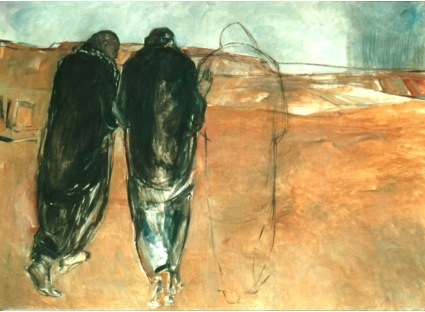Do you know what it means to “cherry-pick” verses from the Bible? When someone is accused of “cherry-picking” verses from the Bible, it means that they have a particular doctrine or idea they want to teach to others, and rather than considering “the whole counsel of God,” they pick a choose a few select verses from various books of the Bible which seems to prove their point or present their case in the strongest possible way.
They often then ignore or minimize texts from the Bible which disprove or contradict the idea or theme they are trying to teach.
 I have often been accused of “cherry-picking” verses from the Bible. This is especially true with my recent emphasis on the non-violence of God. I believe that God is not violent; that in Him, there is no violence at all. I base my view, in large part, on Jesus being the exact representation of God (cf. John 1:14, 18; 14:9-11; 2 Cor 4:4; Php 2:6; Col 1:15; Heb 1:2-3). (Please note that I am not saying God is a pacifist. Far from it. There is a huge difference between pacifism and non-violence.)
I have often been accused of “cherry-picking” verses from the Bible. This is especially true with my recent emphasis on the non-violence of God. I believe that God is not violent; that in Him, there is no violence at all. I base my view, in large part, on Jesus being the exact representation of God (cf. John 1:14, 18; 14:9-11; 2 Cor 4:4; Php 2:6; Col 1:15; Heb 1:2-3). (Please note that I am not saying God is a pacifist. Far from it. There is a huge difference between pacifism and non-violence.)
Jesus was non-violent, and if He perfectly reveals God to us, then this means that God also is non-violent. The only other possibility is that God truly is violent, and Jesus didn’t fully reveal this aspect of God, which means that Jesus is not a very good representation of the true nature and character of God.
Anyway, when I write about the non-violent character and nature of God, I often get accused of “cherry-picking” the Bible. After all, there are hundreds and hundreds of texts in the Bible which portray God as being quite violent. How can I ignore or pass over those sorts of texts in favor of the non-violent texts in the Gospels?
The truth is that I don’t pass over them. I have what I think is a sound logical and theological explanation for these violent texts, which is discovered by looking at Jesus on the cross.
But I am not going to get into my understanding of those violent texts in this post… (but there’s a book coming!)
Instead, I just want to say that even if my understanding of these violent texts is wrong, then I am happy to agree with those who accuse me of cherry-picking the Bible. If I am wrong about how to understand the violence of God in the Old Testament in light of Jesus Christ on the cross, then I will gladly and happily resort to cherry-picking the Bible so that it presents God in a Jesus-looking way.
There are three reasons I don’t mind being accused of cherry-picking verses from the Bible.
1. Jesus Cherry-Picked Verses from the Bible to Present God as Non-Violent
I try to follow the teachings and example of Jesus as best as I can. I fail in many areas all the time, but that is where grace enters the scene.
Anyway, when it comes to presenting God as non-violent, Jesus not only shows by teaching and example that God is non-violent (cf. Luke 6:27-30; 9:54-56; 23:34), but when Jesus declared the purpose of His ministry, He cherry-picked a key Old Testament passage to show that He was not going to be violent at all.
The text I am referring to is Luke 4:16-30. In this text, Jesus lays out His mission statement (Luke 4:18-19), which shows that He is only going to restore, heal, forgive, deliver, and set free. As part of His teaching, Jesus used an illustration from the Old Testament about how God sent Elijah the Prophet to a Gentile woman and a leprous Syrian general.
As a result of this sermon, those who listened to Jesus that day tried to kill Him (Luke 4:28-29). Why did they try to kill Jesus?
Because Jesus cherry-picked the Old Testament to present God as non-violent. His audience believed that God was violent, and this violence is then demonstrated in their attempt to kill Jesus (After all, you become like the god you worship).
How did Jesus cherry-pick the Old Testament?
Well, the text Jesus taught from was Isaiah 61:1-2. But if you go and look at the text that Jesus taught from, and compare it with the text He quoted in Luke 4:18-19, Jesus stopped His quotation midsentence! He didn’t finish reading Isaiah 61:2.
And what did He not read? The next phrase in Isaiah 61:2 talks about “the day of vengeance of our God.” Jesus purposefully ignored this phrase! He excluded it from His reading.

When I first taught on Luke 4 about fifteen years ago, I explained to my congregation that the reason Jesus didn’t talk about the day of God’s vengeance was because the first coming of Jesus, which we read about in the Gospels, was for love, grace, and forgiveness, whereas the second coming of Jesus, which we read about in the book of Revelation, will be full of blood and wrath and violence. I said that since Jesus was only proclaiming the mission statement for His first coming, He had to stop half-way through Isaiah 61:2.
“But watch out!” I told my congregation. “For wrath, and judgment, and blood, and fire are coming! Jesus will return a second time, and you do not want to be on the earth when He comes, for it will be a day of vengeance and death such as the world has never seen.”
Sigh.
I have many regrets about some of the things I preached when I was a pastor, but that is one of the sermons I regret most.
I now believe (because I understand Revelation quite differently … and I will explain how I understand it in a future episode of my One Verse Podcast … make sure you subscribe if you want to hear it) that Jesus stopped half-way through Isaiah 61:2, not because the violence of God was being pushed to some future violent and bloody return of Jesus, but because Jesus wanted us to know that God is love, and in Him there is no violence at all.
To make this point, Jesus cherry-picked Isaiah 61:1-2.
Jesus then went on to cherry-pick a text about how God sent Elijah only to widowed, Gentile women and leprous enemy soldiers (two of the people Jews hated most), to show that these are types of people God is inviting into His Kingdom.
Could Jesus have picked other passages about how God sent prophets to good, morally-upright, Jewish men? Of course. But He didn’t. He picked the worst of the worst (from a Jewish male perspective), and then said, “This is who God loves.”
Naturally, when you preach a sermon like this to a group of people who think God hates filthy Gentile women and leprous enemy soldiers, and that God’s ultimate goal for such people is to kill them and send them to burn forever in hell, you will not be the most popular teacher that this particular audience has ever had.
It would be like going into a super fundamentalist church today and telling them that if Jesus were here today, He would choose gay, transvestite, Muslim jihadists to be His disciples. Imagine the rage! If they didn’t try to stone you on the spot, you would at least be condemned as a heretic liberal who deserved to spend eternity in the deepest hell.
But at least you’d be in good company, because that’s what the religious people said to Jesus too…
So yes, Jesus cherry-picked the Bible to present to His listeners a God who was non-violent. And this message was not any more popular then as it is today.
But Jesus wasn’t the only one who cherry-picked the Bible to present a non-violent God. Paul did it too.
2. Paul Cherry-Picked Verses from the Bible to Present God as Non-Violent
Paul’s magnum opus is his Letter to the Romans. His conclusion to the book is found in Romans 15:7-13, where He basically sums up the entire point and message of Romans for his readers. And the summary of the book is that we should all receive one another, both Jew and Gentile alike, because Jesus has served the Jewish people and brought the Gentile people into the family, so that both might glorify God together (Rom 15:7-9).
Paul then closes with several quotes from the Old Testament which shows how God’s plan all along was to bless the Gentile people so that they might praise Him and glorify Him and sing His name (Rom 15:9-12).
Paul quotes texts like 2 Samuel 22:50 and Psalm 18:49 which say, “For this reason, I will confess to You among the Gentiles, and sing to your name” (Rom 15:9).
Or Deuteronomy 32:52, which says, “Rejoice, O Gentiles, with His people” (Rom 15:10).
Or Isaiah 11:10, which says, “There shall be a root of Jesse; And He who shall rise to reign over the Gentiles, In Him the Gentiles shall hope” (Rom 15:12).
But if you go back and look at the surrounding contexts of these passages which Paul quotes, it is nearly laughable at how Paul completely rips them from their context and quotes them as saying something almost exactly opposite of what they actually say in their context! Paul would get an “F” in almost any seminary for how he cherry-picks the Old Testament texts to make them say what they do not say in context.
For example, the 2 Samuel 22 and Psalm 19 passages do talk about how the Gentiles will sing praises to God. But do you know why they sing praises? In these chapters, the author is basically saying this: “All my Gentile enemies are dead or have become my slaves! Yay! And as a result, they now know that you alone are God! Now they are finally praising you, God! Because they are dead.”
But that is not really what Paul seems to have meant when he quoted that text.
It’s the same with his quotation of Deuteronomy 32:43. In the context, Moses sort of writes a farewell song to Israel, and in it he basically says, “Rejoice, Oh Gentiles! Because God is about to set up Israel in the Promised Land. After He kills everyone who lives there! But that is how you Gentiles will come to know the true and only God! So rejoice! You have been living in sin and violence, but after we come through and slaughter you all, you will finally know the truth! And the slaughter will be so bloody, that God’s arrows will become drunk with blood, and his sword will feast on the blood of the severed heads of the enemy! So rejoice, Oh Gentiles!”
… The whole text is rather twisted. But Paul takes one verse out of this twisted text, a verse about the Gentiles rejoicing, and quotes it approvingly. Talk about avoiding violent passages to cherry-pick the Bible!
Just one more. Paul also quotes Isaiah 11:10. This passage pronounces a blessing on the Gentiles, which is what Paul quotes, but again, in the context, the reason the Gentiles are blessed is because they have all either been killed or have become slaves to Israel. It is sort of saying, “You Gentiles have been running this world into the ground, but now that all you troublemakers have been killed or enslaved, we can start ruling the world the way God really wants. So praise God! Peace has finally arrived!”
I am not trying to make light of any of this. These are extremely troubling texts. These are the sorts of passages that cause some people to reject Christianity and deny God and say that if this is the way God is, they want nothing to do with him.
And I agree.
But thankfully, this is not the way God is, as both Jesus and Paul have shown us.

But there is one more reason why I don’t mind being accused of cherry-picking verses from the Bible.
Everybody Cherry-Picks Verses from the Bible (Even you)!
A few minutes of thought reveals that everybody cherry-picks verses from the Bible. It is impossible not to.
The only alternative to cherry-picking verses from the Bible is to allow every verse in the Bible to be of equal weight, significance, and importance. But nobody does that. Nobody.
Look, do you highlight or underline or memorize verses in your Bible that are especially meaningful to you? If so, you cherry-pick verses from the Bible. I mean, have you highlighted Ezekiel 23:20-21 in your Bible? Have you memorized this verse and meditate upon it for encouragement when you’re feeling down? Probably not.
When you decide to evangelize or witness to somebody, do you pick and choose a few verses from various places in the Bible to share? I sure hope so! The only alternative is to throw the whole Bible at someone and say, “Here, read this!” But if you do pick and choose, then you are, by definition, cherry-picking verses from the Bible.
So since everybody cherry-picks verses from the Bible, the only time you will ever get accused of cherry-picking is when they don’t like the verses you picked to prove your point, because the verses they cherry-picked prove a different point.
So how then Should we Cherry-pick verses from the Bible?
Since we are all going to cherry-pick verses from the Bible, and since both Jesus and Paul also cherry-picked verses from the Bible, it seems sort of wise to follow their example in cherry-picking verses, and pick the verses that look more like Jesus. When you cherry-pick verses from the Bible, pick those that present truth and present theology that lead people into an understanding of God that looks just like Jesus Christ.
Pick verses that are full of grace, mercy, forgiveness, and enemy-love. Then read the other verses in light of these. We don’t toss out into the garbage heap the verses that didn’t get picked. No, instead we read them in light of the verses that we did pick.
By cherry-picking texts out of the Bible to reveal the goodness, and love, and mercy, and grace, and acceptance of God, while at the same time, soundly rejecting and denying the texts which talk about a bloodthirsty god of violence, we have seen that both Jesus and Paul are saying what we can loudly proclaim today as well: “God is not like that! God is love, and in Him there is no violence at all!”
So do I cherry-pick verses from the Bible? Well, I hope not. I try not to. But IF I am guilty of it, I at least have good examples in the Jesus and Paul, who also cherry-picked verses in the Bible to prove that God was like Jesus, and in Him there was no violence at all. (And please don’t point to the cleansing of the temple or Jesus’ instruction for the disciples to go buy a sword.)




 But I also knew that knowing Scripture, and knowing theology, and knowing about grace is not really the point of it all. The point of it all is to actually
But I also knew that knowing Scripture, and knowing theology, and knowing about grace is not really the point of it all. The point of it all is to actually 
 And trust me … if you follow Jesus, you will never get bored.
And trust me … if you follow Jesus, you will never get bored.

 This sort of makes God like Freddy Krueger, except that He carves up His own Son.
This sort of makes God like Freddy Krueger, except that He carves up His own Son. God has redeemed the crucifixion so that we now sing songs about it and listen to sermons about the horrible death of an innocent victim with smiles on our faces. But this doesn’t make the crucifixion “good.” It only reveals God’s ability to redeem anything and everything.
God has redeemed the crucifixion so that we now sing songs about it and listen to sermons about the horrible death of an innocent victim with smiles on our faces. But this doesn’t make the crucifixion “good.” It only reveals God’s ability to redeem anything and everything. 




